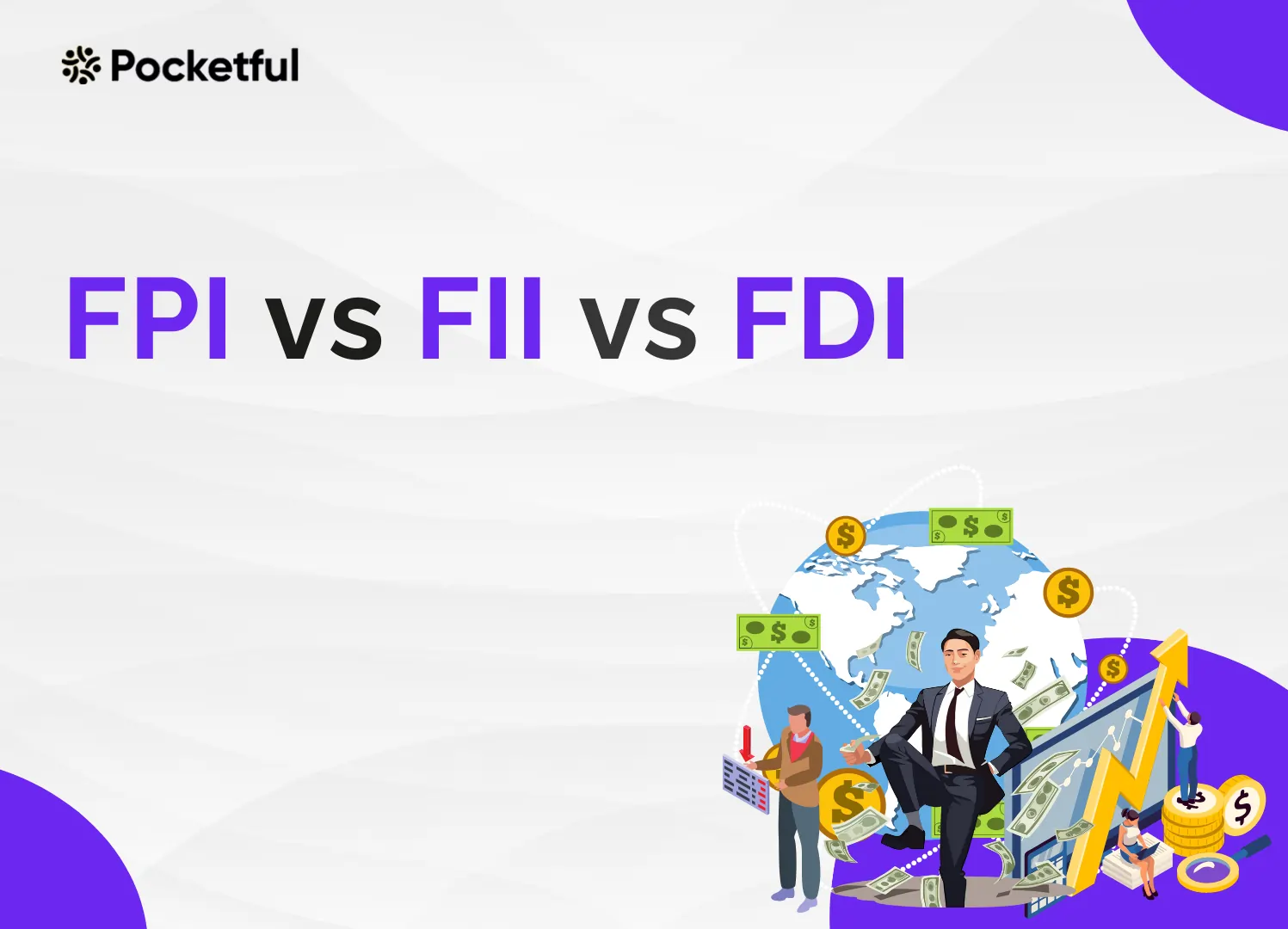| Type | Description | Contributor | Date |
|---|---|---|---|
| Post created | Pocketful Team | Jun-27-24 | |
| Update Formatting | Nisha | Feb-24-25 |

- Blog
- fii vs fdi vs fpi
FII vs FDI vs FPI: What Is the Difference Between FDI, FII, & FPI

Large market players worldwide are known for their ability to significantly affect a country’s financial structure. Today’s blog will cover the realm of domestic and foreign investment and its impact on the country’s capacity for growth.
Let’s dive in and understand the distinctions between Foreign Portfolio Investor (FPI), Foreign Institutional Investors (FIIs), and Foreign Direct Investments (FDIs).
Foreign Institutional Investors (FIIs)

FII stands for Foreign Institutional Investors, such as pension funds, mutual funds and insurance companies, that invest in a country’s stock market from outside the country. These investors play a significant role in the financial markets of developing countries like India by providing a fresh source of capital and liquidity.
FII activity is influenced heavily by broader macroeconomic factors such as global economic conditions, interest, and currency exchange rates. Analyzing FII activity with other economic indicators can give a more comprehensive understanding of the factors impacting the financial markets. Additionally, sudden changes in FII activity can contribute to increased market volatility.
Types of FIIs include pension funds, insurance companies, sovereign wealth funds (SWFs), mutual funds, and endowment funds.
Foreign Direct Investors (FDI)

FDIs are companies from one country investing in businesses in another, intending to establish a long-term interest and control over the investment.
It can take many forms, such as mergers and acquisitions, joint ventures, greenfield investments, and brownfield investments.
Note:
- Greenfield investment – when a foreign company builds a new facility from scratch in a foreign country.
- Brownfield Investment – When a foreign company acquires an existing facility in a foreign country.
Foreign Direct Investment can significantly boost a country’s economic growth by introducing new capital, technology, and expertise. It can also generate jobs and increase exports.
Governments generally implement policies to regulate foreign direct investment and these policies are designed to attract direct investment by offering tax breaks and other incentives. These policies also aim to protect domestic industries from foreign competition.
Foreign Portfolio Investment (FPI)

FPI involves acquiring financial assets in a foreign country, including stocks, bonds, mutual funds, or ETFs. Unlike FDI, FPI investors do not aim to exert control over the companies in which they invest. They simply want to earn money from their investment through capital gains or dividends.
FPI investors seek short-term to medium-term returns and have the flexibility to buy and sell their holdings on a stock exchange with ease. They do not have a say in the management of the companies they invest in and are dependent on the performance of the overall stock market
Differences Between FDI, FII, and FPI
| Basis | Foreign Direct Investment (FDI) | Foreign Institutional Investment (FII) | Foreign Portfolio Investment (FPI) |
|---|---|---|---|
| Investment Type | Direct Investment in physical assets or companies | Investments in financial assets on behalf of large foreign institutions | Investment in financial assets for the sake of earning higher returns by a broader category including individuals. |
| Control | Investors intend to have a controlling interest in the investment. | FIIs are often fund houses who act as an intermediary and thus the root-investor has no control. | Investors generally do not have control. |
| Investment Horizon | Long-term | Medium to long-term | Short-term to medium-term. |
| Risk | Reduced volatility over long periods but moderate risks exist. (Political, economic, regulatory and cultural risks). | Moderate to high risk depending on the investment strategy | Higher volatility as the horizon is only for the short term. |
| Examples of Investors | MNCs, large enterprise, and private equity firms. | Pension Funds, insurance companies, and mutual funds. | Individual investors, mutual funds, and hedge funds. |
Read Also: What are the Advantages and Disadvantages of FDI?
Impact on the Economy

Economic Impact of FDI
- FDI brings in fresh capital for businesses, which can be used for expanding operations, driving innovation, and creating new jobs in the long run.
- Foreign companies bring advanced technology and expertise, which improves productivity.
- FDIs can help local companies reach global markets through the networks and supply chains of multinational companies.
Economic Impact of FII
- FIIs inject liquidity into the stock market, making it more appealing to other investors.
- Increased foreign investment can potentially result in reduced interest rates. This is because there is more money available to lend, which drives down the borrowing costs for businesses and consumers. This can stimulate economic activity.
- The presence of FII can enhance corporate governance in companies
Economic Impact of FPI
- FPIs bring in more capital, which boosts trading activity in the financial markets. Increased liquidity helps investors trade securities more easily, without affecting prices significantly.
- Domestic investors can reduce risk by expanding their investment portfolios with the help of the FPIs, across different asset classes and geographies.
- To attract foreign investors, governments can make changes to improve the investment climate, like adjusting regulations, offering tax incentives, and enhancing infrastructure.
Conclusion
The world of international investment is intricate; thus, grasping the pivotal actors is imperative. FPIs and FIIs focus heavily on earning higher returns by entering new markets. Therefore, it is natural for them to exit at the slightest possibility of losses. This exposes retail investors to immense risks as they face the brunt of their selfish actions.
Therefore, understanding these types of investments empowers individuals to make informed decisions when participating in the stock market.
Frequently Asked Questions (FAQs)
What is the difference between FPI and FII?
Both invest in foreign markets, but FPIs focus on financial assets (stocks, bonds) for short-term returns, while FIIs focus on mid to long-term gains by gaining control over companies.
What are the benefits of FDI for a host country?
Benefits of FDI include new job creation, technology transfer, and infrastructure development.
What are the risks of FII for a country?
Market volatility is a major risk as investors can get spooked and pull out their money quickly.
What can be done to mitigate the negative impact of FPIs?
Effective regulatory frameworks, prudent economic policies, and continuous monitoring are essential to balance the benefits of FPI inflows while minimizing the risks to the economy.
What role do FIIs play in corporate governance?
FIIs often advocate for higher corporate governance standards, greater transparency, and better management practices to protect their investments.
Disclaimer
The securities, funds, and strategies discussed in this blog are provided for informational purposes only. They do not represent endorsements or recommendations. Investors should conduct their own research and seek professional advice before making any investment decisions.